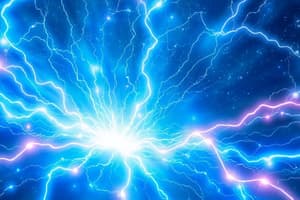Podcast
Questions and Answers
How are conductors and insulators differentiated based on the flow of electric charges?
How are conductors and insulators differentiated based on the flow of electric charges?
- Insulators allow rapid flow, while conductors do not
- Both conductors and insulators allow rapid flow
- Conductors allow rapid flow, while insulators do not (correct)
- Neither conductors nor insulators allow rapid flow
What does the electric potential represent?
What does the electric potential represent?
- Rate of flow of electric charges
- Force exerted by an electric field
- Distance between charges
- Energy per unit charge (correct)
How is the electric field intensity related to the electric potential?
How is the electric field intensity related to the electric potential?
- E = -V
- E = -∇V (correct)
- E = 1/V
- E = ∇V
What is the formula for the electrostatic force between two charged particles?
What is the formula for the electrostatic force between two charged particles?
Which fundamental interaction allows for the understanding of static electricity and the behavior of capacitors?
Which fundamental interaction allows for the understanding of static electricity and the behavior of capacitors?
Why is learning about electric charges and fields considered an essential stepping stone in physics?
Why is learning about electric charges and fields considered an essential stepping stone in physics?
What does the electric field intensity represent?
What does the electric field intensity represent?
Which quantity is used to quantify the electric field intensity?
Which quantity is used to quantify the electric field intensity?
In Gauss's law, what does the closed surface integral of the electric field signify?
In Gauss's law, what does the closed surface integral of the electric field signify?
What does Gauss's law relate to?
What does Gauss's law relate to?
Which concept quantifies the total electric flux through a closed surface in Gauss's law?
Which concept quantifies the total electric flux through a closed surface in Gauss's law?
How is the strength of an electric field typically quantified?
How is the strength of an electric field typically quantified?
Flashcards are hidden until you start studying
Study Notes
Electric Charges and Fields
Electric charges and their interactions form the cornerstone of our understanding of electromagnetism, a fundamental force that shapes the world around us. In this exploration, we'll delve into the essential concepts of electric field intensity, Gauss's law, electric potential energy, conductors and insulators, and charge interactions.
Electric Field Intensity
An electric field is created by electric charges, acting like invisible arrows that point in the direction a positive charge would move when placed in that location. The strength of this field is quantified by electric field intensity, denoted as E. The electric field intensity is a vector that points in the direction of the force acting on a positive charge placed at any given point in the field. Its magnitude is given by the force acting on a unit positive charge, divided by the charge.
Gauss's Law
Gauss's law is a fundamental relationship between electric charge and electric field, which states that the total electric flux through a closed surface is proportional to the total charge enclosed by that surface. Mathematically, this is expressed as:
[ \oint_{S} \textbf{E} \cdot d\textbf{A} = \frac{Q_{enc}}{\varepsilon_{0}} ]
where E is the electric field intensity, (d\textbf{A}) is an infinitesimal area vector, (Q_{enc}) is the total charge enclosed by the surface (S), and (\varepsilon_{0}) is the permittivity of free space.
Electric Potential Energy
The electric potential energy of an electric charge is a measure of its energy in an electric field. The electric potential, denoted as (V), is a scalar quantity representing the potential energy per unit charge. The electric field intensity is related to the electric potential through the relationship:
[ \textbf{E} = -\nabla V ]
where (\nabla) is the gradient operator.
Conductors and Insulators
Conductors and insulators are materials that have contrasting behaviors when it comes to the flow of electric charges. Conductors, like metals, allow the rapid flow of electric charges, whereas insulators, such as rubber or glass, do not.
Charge Interactions
Electric charge interactions can be described in terms of the electrostatic force, which acts between any two charged particles. The magnitude of the force, denoted as (F), is given by Coulomb's law:
[ F = k\frac{q_{1}q_{2}}{r^{2}} ]
where (k) is the Coulomb constant ((8.99 \times 10^9 \text{ N} \cdot \text{m}^2 \text{C}^{-2})), (q_{1}) and (q_{2}) are the charges of the particles, and (r) is the distance between them.
The electrostatic force is a fundamental interaction that allows for the understanding of phenomena such as static electricity, the behavior of capacitors, and the formation of electric fields.
Learning about electric charges and fields is an essential stepping stone towards understanding some of the most profound phenomena in our universe, from the behavior of atoms and molecules to the cosmic dance of galaxies. Armed with this knowledge, we can better appreciate and harness the power of electricity, a vital force shaping our modern world.
Studying That Suits You
Use AI to generate personalized quizzes and flashcards to suit your learning preferences.




